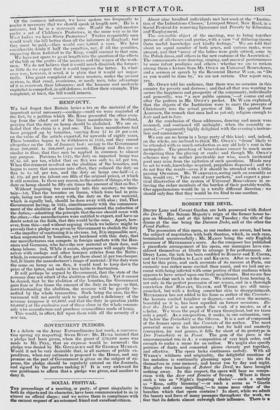HEMP-DUTY.
WE had forgot that Britain levies a tax on the material of the important naval necessary—cordage—until we were reminded of the fact, by a petition which Mr. Ross presented the other even- ing from the chief seat of the linen manufacture in Scotland, praying that the duty on hemp should be abolished. We are sa- tisfied that the claim is a just one. The linen manufacture had been propped ,up by bounties, varying from 15 to 20 per cent. on the value of the article exported, for upwards of eighty years. These bounties began to be withdrawn in 1825, and they ceased altogether on the 5th of January last; saving to the Government from 200,000/. to 300,000/. per annum. Hemp and flax are so similar in fibre, that they may be applied in common to almost any purpose. Previous to 1825, the duty on imported hemp was 9/. 6s. 8d. per ton, whilst that on flax was only Sr. 4d. per ton. When Government resolved on the abolition of the bounties, and began to carry that measure into effect, they reduced the duty on flax to I-s. 8d. per ton, and the duty on hemp one-half—i. e. 4/. 13s. 4d. per ton (about one fifth of the original price), at which it still remains. Is there any reason, in the nature of things,why the duty on hemp should be fifty-six times the amount of that on flax? Without inquiring too curiously into this mystery, we main- tain-1st, That the bounties on linens, which were bad in prin- ciple, being now done away with, the duty on the raw material, which is equally bad, should be done away with also ; 2nd, That Government having, in 1825, simultaneously with the commence- ment of the abolition of the bounties, commenced the reduction of the duties,—admitting the principle that the one should cease with the ether,—the manufacturers were entitled to expect, and have no doubt acted on the faith, that this would be the case. Apart, how- ever, from this—and without arguing (which we believe might be proved) that a pledge was given by Government to abolish the duty —the impolicy of continuing it is obvious. 1st, It is impossible now, when unprotected by bounties, yet burdened with this duty, that our manufacturers can compete in foreign markets with the Rus- sians and Germans, who have the raw material at their door, and cheap labour. 2nd, While it exists, shipowners will supply them- selves with cordage and other hempen articles from the Baltic; which, in consequence of it, they get there about Si. per ton cheaper. 3rd, It limits the manufacturer's range of material : if the duty were the same on hemp as on flax, it would tend to keep down the price of the latter, and make it less liable to fluctuation. It will perhaps be argued by Government, that the state of the revenue does not admit of the abolition of this duty. Yet it cannot be denied, that by the abolition of the bounties, the Government gain four or five times the amount of the duty on hemp : so that, notwithstanding the abolition, the revenue will be greatly be- nefited by the whole transaction. Such being the case, the Go- vernment will not surely seek to make good a deficiency of the revenue (suppose it 60,000/. and that the duty in question yields 60,000/.) at the exclusive cost of those alone in the whole commu- nity who manufacture and purchase commodities made of hemp.
This would, in effect, fall upon them with all the severity of a new tax.


























 Previous page
Previous page